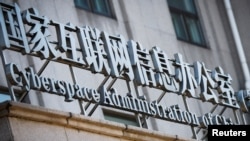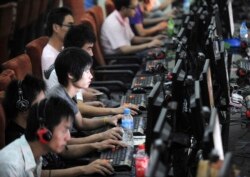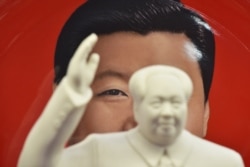On January 27, Qin Gang, China’s ambassador to the United States, spoke with National Public Radio’s Steve Inskeep.
Qin discussed issues ranging from the upcoming Winter Olympics in Beijing to a potential military conflict between China and the United States over Taiwan.
Qin said Chinese people broadly support the government, and he cited annual surveys from the Kennedy School of Government at Harvard University as evidence.
But Inskeep asked him why China’s government, if so popular, uses repressive measures, including “widespread facial recognition software, internet censorship and other means to limit speech and effectively control the people.”
Qin disputed Inskeep’s depiction, focusing on internet freedom in China.
“That’s a misunderstanding,” he said. “Actually, Chinese people can have wide access to information on the internet. There are over one billion netizens in China, the world’s largest number of internet users. Every day people can get access to different resources of information. And they can comment and they can exchange.”
Inskeep suggested that while Chinese people continue to have access to an enormous amount of information, controversial topics and criticism of the government are scrubbed from the internet.
Qin said it is “not true” that criticism of the government does not last long online, adding that “the government has many channels to solicit opinions from the people, including criticism.”
However, it is false to say China’s highly curated internet does not drastically limit access to information or severely limit public criticism of the government.
In fact, the Chinese government enforces some of the world’s most restrictive controls. It blocks off large portions of the internet to “ensure state security and social harmony.”
China maintains that control through a strict legal and regulatory environment and internet filters that allow sweeping manipulation of online discourse.
In its 2021 Freedom of the Net report, the nonprofit advocacy group Freedom House called China “the world’s worst abuser of internet freedom for the seventh consecutive year.”
Dozens of Chinese government bodies, in concert with internet service providers and an army of online censors, help police the country’s online space.
The government has been developing its regime of internet controls for decades.
The U.K.-based policy institute Chatham House wrote that even before President Xi Jinping took the helm of the Chinese Communist Party in late 2012, China was “already home to one of the world’s most sophisticated and restrictive systems of internet control.”
In 1997, China’s Ministry of Public Security issued comprehensive regulations on internet security, protection and management.
The ministry banned a broadly defined, and at times vague, range of activities online. These included using the internet to make false statements, distort the truth, spread rumors, destroy the order of society, injure the reputation of state organs or incite the overthrow of the government or socialist system.
As early as 2002, researchers at Harvard University found that China was blocking thousands of websites “offering information about news, health, education, and entertainment.”
At that time, 40 of the top 100 Google searches for "democracy china” were blocked. The methods and mechanisms of control have evolved since then.
In 2008, after more than a decade in the making, China implemented the Golden Shield project. The Hong Kong Free Press described Golden Shield as “a national filter that blocks politically sensitive content from entering the domestic network.”
Golden Shield is often referred to as “the Great Firewall of China,” partially because of its “content-filtering firewalls.”
Freedom House called China’s “Great Firewall” the “world’s most sophisticated internet censorship apparatus.”
According to Freedom House, Chinese authorities, by broadly blocking social media platforms and posts that can in any way be viewed as undermining China’s one-party system, ensure that users only have access to “a highly censored, monitored, and manipulated version of the internet.”
Facebook, Twitter, Google, Wikipedia and YouTube are among the thousands of websites that are blocked in China.
In 2008, unprecedented protests took place in China on the anniversary of the 1959 Tibetan Uprising, and the Summer Olympics were held in Beijing. The following year, massive riots broke out in Xinjiang.
Those events precipitated harsher internet controls. For example, China blocked YouTube repeatedly in 2008 and 2009 after videos of the unrest in Tibet were uploaded to the platform.
The controls tightened once Xi Jinping came to power.
An internal Chinese Communist Party directive first circulated in July 2012 warned that “freedom of the press” was being used as a pretext to undermine the “principle that the media should be infused with the spirit of the party.”
That document said subordination of media to “party discipline” was being undermined through promotion of “the free flow of information on the internet” and “slandering our country’s efforts to improve internet management by calling them a crackdown on the internet.”
The New York Times reported in 2013 that the document “bears the unmistakable imprimatur of Xi Jinping.”
Yaqui Wang, Human Rights Watch’s senior China researcher, noted the document “set the tone” for “a period of unrelenting crackdowns on the internet, media, civil society and education.”
“Gradually, the experience of being online in China changed," Wang wrote. "The list of banned words and images grew. Articles and posts that managed to be published got removed quickly. The government got savvier, and more aggressive, about using its own technology: AI-powered censors could scan images to determine whether they contained certain sensitive words or phrases. An increasing number of foreign websites were blocked by the Great Firewall.”
In 2013, tough measures were launched to stop the spread the spread of online rumors.
The space for expression online continues to shrink.
In 2018, the Cyberspace Administration of China (CAC) ordered the deletion of thousands of “self-media” and social media accounts to stop the spread of “politically harmful information” or “vulgar” content, the Washington D.C.-based group Chinese Human Rights Defenders reported.
The CAC said 110,000 accounts and 486,000 posts had been removed by December 2018.
Official media, already operating under rigid state directives, have also seen greater restrictions.
In January 2021, Chinese officials said they would vet the social media posts of journalists while renewing their press credentials.
In August 2021, Foreign Policy’s Tracy Wen Liu reported that increasingly large numbers of people are being censored online, in part, because “the censorship machinery” runs on a quota system.
Liu argued that people are “too afraid to post meaningfully threatening or dissident content,” leading the censors to “brand milder content as unacceptable to meet their own quotas.”
This has included an online crackdown on the LGBT community.
Liu and Human Rights Watch’s Yaqui Wang have both documented how aggressive nationalists are further able to dictate online discourse. Wang specifically links this rise in online nationalism to the internet ecosystem created under the Great Firewall.
Ambassador Qin claimed there are many channels for criticism of the government. But in practice, serious criticism of government policy, and even mild mockery, are banned.
In March 2020, former real estate tycoon Ren Zhiqiang went missing after writing an essay critical of the CCP’s handling of the coronavirus outbreak. The essay alluded to Xi, but did not mention him by name.
Ren was later sentenced to 18 years in prison on corruption, bribery and embezzlement charges that he did not contest.
In May 2020, Chen Jieren, a former state media journalist turned anti-corruption blogger, was jailed for 15 years for “picking quarrels and provoking trouble,” “extortion and blackmail,” “illegal business activity” and “bribes.”
In truth, Chinese Human Rights Defenders said, Chen was jailed for exercising his freedom of expression. They argued the harsh sentence was intended to send a “chilling signal to online independent commentators and citizen journalists.”
Even the censors are not safe.
In 2021, Peng Bo, former deputy chief of the Chinese cybersace agency, was expelled from the CCP and charged with corruption after investigators found he had “strayed from the decisions and plans laid down by the Party Central about the propaganda struggle over the internet.”
Poking fun at Xi is also not permitted.
After Xi was mocked for using the contrived phrase “sprinkling pepper” in a February 2021 speech, the word pepper “was completely censored on Weibo for eight days after the speech,” China Digital Times reports.
Likewise, Chinese authorities added Winnie the Pooh to an internet blacklist after netizens compared Xi’s physical appearance to that of the cartoon bear.
The political risk news and analysis site Global Risks Insights said “Beijing sees a serious effort to undermine the dignity of the presidential office and Xi himself” in the comparison.
But Global Risks Insights also noted China has lost the opportunity to seize on a potentially “positive, and organic, public image campaign for Xi,” thus highlighting the touchiness of authoritarian regimes.
Meantime, Beijing also manipulates online discourse using an army of fake commentators.
A 2016 Harvard University study found that the Chinese government “fabricates and posts about 448 million social media comments a year.”
The researchers found that online commentators, rather than engaging critics of the Chinese government, are carrying out a campaign of “strategic distraction from collective action, grievances or general negativity.”








